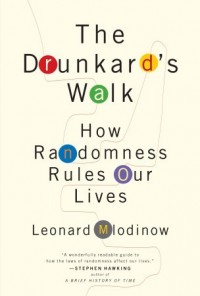

~~Moved from GR~~
The Drunkard's Walk: How Randomness Rules Our Lives
by Leonard Mlodinow
Agh, I love this book. The first time I read it, I hadn't yet encountered The Tipping Point: How Little Things Can Make a Big Difference or Freakonomics: A Rogue Economist Explores the Hidden Side of Everything. On a second read, I discovered just how snarky Mlodinow is about them and their tendency to infer patterns where they may or may not exist. I still think he goes too far, though. Just because randomness is everywhere doesn't mean that there isn't an underlying signal; randomness doesn't imply 50-50.
The title comes from one of the many appellations for a Markov chain, also known as a random walk. The basic idea: you went to a pub and had a bit too much. On the way home, a policeman pulls you over for a DIY and has you walk the line. You're really, really wobbly: each step you take moves you forward, but also moves you either to the left or to the right with equal probability. So where will you end up? Sure, in expectation, you'll end up right on the line, but the probability that you actually end up on the line is surprisingly low.
Here is a link to an interactive demo (also embedded below, but doesn't show up in the feed version of the review). The bar chart indicates the distribution (counts) of where you end up (how far to the left or to the right of your starting point).
Notice that there are some serious outliers--there are bound to be. That's the nature of a random process. The problem develops when we identify outliers and begin to attribute meaning, talent, or any other reason to the "success" or "failure" of these outliers.
Mlodinow is both knowledgeable and passionate about his subject, and puts together a large number of examples in which not fully taking randomness into account has been disastrous in analysing data. He does a great job of providing an intuitive and entertaining introduction to probability and statistics, and the book is absolutely chock-full of stories which are both entertaining and illuminating. I found the book a little problematic because I think Mlodinow goes too far in the other direction. In several cases, he seems to me to conflate randomness with the total lack of signal, and this seems to me to be both problematic and dangerous. One example he uses is our reverence for the one-in-a-million entrepreneurs which succeed. He points out that given a very large sample, the probability of having one success is actually very large and implies nothing about the individual who succeeds. However, to me, it is just as dangerous to assume that there is no underlying signal (that essentially everything is blind luck) as it is to assume that everything has a deeper meaning. Oftentimes, we treat something as (totally) random because we don't have the knowledge to make a better prediction.
For example, we talk about a coin flip as if it were totally random, drawn from a uniform distribution. But if you are flipping a coin and I am able to observe the angle and initial velocity, then I can do a heck of a lot better than a 50-50 guess! The same is true of the entrepreneur example. Just because we can talk about the probability of success doesn't imply that some internal mechanism doesn't exist! Mlodinow seems to me to assume that if the current features don't do a good job predicting outcomes, the outcomes must be (totally) random. He doesn't seem to consider that we might just be using the wrong features for the predictions. It's actually a surprisingly deep philosophical question: is randomness just the lack of knowledge of the important parameters, or are there innately unpredictable events in the world?
All the same, I think this is a wonderful read and a great reality check for all of us who assume skill and meaning rule everything in our lives.

 7
7




